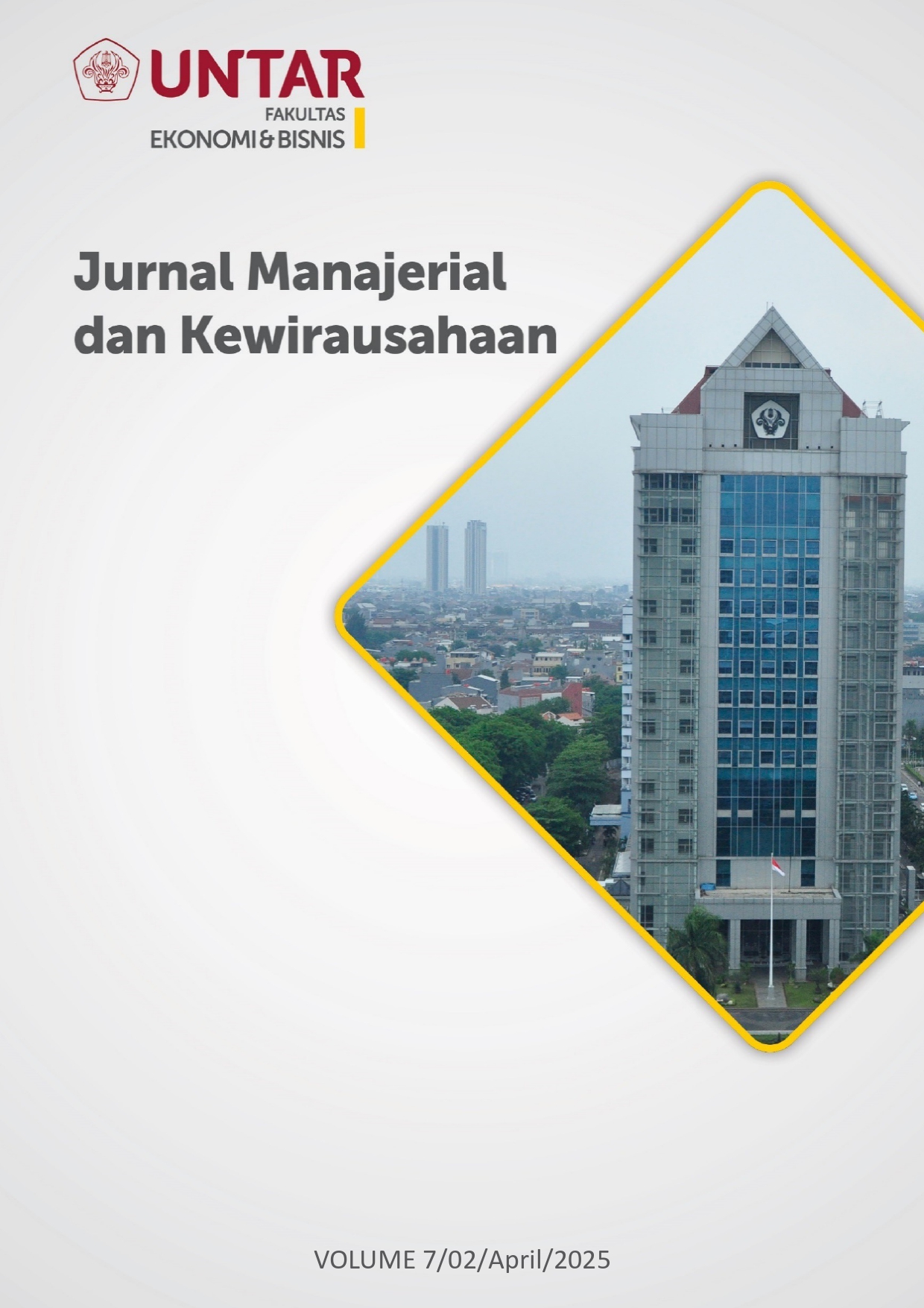Apakah Persepsi Kontrol Perilaku Memediasi Penentu Intensi Berwirausaha?
Main Article Content
Abstract
This study aims to examine the influence of entrepreneurship education (EE), entrepreneurial creativity (EC), and entrepreneurial passion (EP) on entrepreneurial intention (EI) among private university students in West Jakarta, with perceived behavioral control (PBC) as a mediating variable. The research employs a quantitative approach, collecting data through questionnaires distributed to students. The findings are expected to reveal the importance of entrepreneurship education (EE), entrepreneurial creativity (EC), and entrepreneurial passion (EP) in shaping entrepreneurial intention (EI). Furthermore, the role of perceived behavioral control (PBC) is explored to understand its mediating effect on the relationship between entrepreneurial factors and entrepreneurial intention (EI). The results of this study will contribute to the development of effective educational strategies and entrepreneurial programs to foster an entrepreneurial spirit among students.
Article Details
Section

This work is licensed under a Creative Commons Attribution-NonCommercial-ShareAlike 4.0 International License.
This work is licensed under a Jurnal Muara Ilmu Ekonomi dan Bisnis Creative Commons Attribution-ShareAlike 4.0 International License.,/p>
References
Adha, M. A., Wibowo, A., Faslah, R., Ariyanti, N. S., Lutfia, A. (2022). Students ideal career in the 4.0 industrial. Journal of Eastern European and Central Asian Research, 9(4), 651–664. https://doi.org/10.15549/jeecar.v9i4.928
Ajzen, I. (1991). The Theory of Planned Behavior. Organizational Behavior and Human Decision Processes, 50(2), 179-211. https://doi.org/10.1016/0749-5978(91)90020-T
Anjum, T. F. (2021). Entrepreneurial intention: creativity, entrepreneurship, and university support. Journal Open Innovative Technology, 7(1), 1-13. https://doi.org/10.3390/joitmc7010011
Aurellia, K., & Puspitowati, I. (2023). Pengaruh pendidikan kewirausahaan, kreativitas, dan efikasi diri kewirausahaan terhadap intensi berwirausaha. Jurnal Manajerial dan Kewirausahaan, 5(3), 677-686. https://doi.org/10.24912/jmk.v5i3.25407
Endhy, R. P. (2022). The Role of Entrepreneurial Passion, Entrepreneurial Creativity and Self- Efficacy in Developing the Entrepreneurial Intention of Indonesian Students. International Journal of Science and Management Studies, https://doi.org/10.51386/25815946/ijsms-v5i4p121
Fauzan Lubada, D. D. (2021). The Mediating Entrepreneurial Self-efficacy Between Entrepreneurship Education, Need For Achievement, and Creativity on Entrepreneurial Intention. Journal of Business and Management Review, 832-849.
Fayolle, A. a. (2015). The Impact of Entrepreneurship Education on Entrepreneurial Attitudes and Intention: Hysteresis and Persistence. Journal of Small Business Management, 53, 75-93. https://doi.org/10.1111/jsbm.12065
Ferreira, M. N.-F. (2023). The role of self-efficacy, entrepreneurial passion, and creativity in developing entrepreneurial intentions. Frontiers in Psychology, 14, 1134618. https://doi.org/10.3389/fpsyg.2023.1134618
Hamdani, A. &. (2020). The role of entrepreneurship in economic development: A study in the context of Indonesia. Journal of Economics and Business, 14(2), 54-68. https://doi.org/10.1234/jeb.v14i2.178.
Ibourk, H. O. (2023). Perceived effectiveness of entrepreneurship education, entrepreneurial mindset, entrepreneurial self-efficacy and entrepreneurial intention among Moroccan university students: A correlational study. Social Sciences & Humanities Open, https://doi.org/10.1016/j.ssaho.2023.100719
Jena, R. K. (2020). Measuring the impact of business management Student’s attitude towards entrepreneurship education on entrepreneurial intention: A case study. . Comput. Human Behav., 107:106275. https://doi.org/10.1016/j.chb.2020.106275
Katadata. (2023, May 18). Jumlah Wirausahawan di Indonesia Ganjal Pertumbuhan Ekonomi. Retrieved from Katadata: https://katadata.co.id/analisisdata/6464b3d3c584e/jumlah-wirausahawan-di-indonesia-ganjal-pertumbuhan-ekonomi
Khamimah, W. (2021). Peran Kewirausahaan Dalam Memajukan Perekonomian Indonesia. Jurnal Disrupsi Bisnis, 228-240.
Khemakhem, H. R. (2021). Entrepreneurial Passion And Entrepreneurial Intention: The Mediating Role of Perceived Behavioral Control. International Journal of Entrepreneurship and Business Development, 418 .
Lestari, E. D. (2024). What Motivates Student to Pursue Entrepreneurial Endeavours? International Journal of Management Studies, 31(2), 395-430. https://doi.org/10.32890/ijms2024.31.2.2
Loria, A., & Rodhiah, R. (2020). Pengaruh personal attitude, subjective norm, dan perceived behavioral control terhadap entrepreneurial intention. Jurnal Manajerial dan Kewirausahaan, 2(3), 653-661. https://doi.org/10.24912/jmk.v2i3.9577
Murad, M. L. (2021). The influence of entrepreneurial passion in the relationship between creativity and entrepreneurial intention. International Journal Global Business, 16, 51–60. https://doi.org/10.1007/s42943-021-00019-7
Murnieks, C. Y. (2020). Pathways of Passion: Identity Centrality, Passion, and Behavior Among Entrepreneurs. Journal of Business Venturing, 35(4), 105944. https://doi.org/10.1016/j.jbusvent.2020.105944
Nguyen Anh Tuana, D. T. (2019). Factors affecting entrepreneurial intentions among youths in Vietnam. Children and Youth Services Review, 186–193. https://doi.org/10.1016/j.childyouth.2019.01.039
Olivia. M., & Nuringsih, K. (2022). Peran pengetahuan kewirausahaan dan media sosial dalam pengembangan kreativitas berwirausaha. Jurnal Muara Ilmu Ekonomi dan Bisnis, 6(1), 203-212. https://doi.org/10.24912/jmieb.v6i1.13360
Pitombeira, R. T., Sousa-Filho, J. M., & Neto, M. N. (2023). Passion, education, and creativity and their effects on entrepreneurial intention. Revista de Administracao de Empresas, 02021–0438, 2023. https://doi/org/10.1590/S0034-759020230606
Saboor, M. J. (2020). Entrepreneurial passion and intention: Creativity and perceived behavioral control as mediators. Journal of Managerial Sciences, 14(2), 10-19.
Shi, Y. Y. (2020). Investigating the relationship between creativity and entrepreneurial intention: the moderating role of creativity in the theory of planned behavior. Frontiers in Psychology, 11:1209. https://doi.org/10.3389/fpsyg.2020.01209
Soelaiman, L., Selamat, F., & Puspitowati, I. (2023). Exploring the predictive factors of gen Z readiness for entrepreneurship. International Journal of Research in Business and Social Science, 12(5), 10-16. https://doi.org/10.20525/ijrbs.v12i5.2757
Sun, J. S. (2023). From entrepreneurship education to entrepreneurial intention: Mindset, motivation, and prior exposure. Frontiers in Psychology, 140. https://doi.org/10.3389/fpsyg.2023.954118
Syed, I. B. (2020). From entrepreneurial passion to entrepreneurial intentions: The role of entrepreneurial passion, innovativeness, and curiosity in driving entrepreneurial intentions. Personality and Individual Differences, 157(2):109758 https://doi.org/10.1016/j.paid.2019.109758
Wijaya, F., & Hidayah, N. (2024). Pengaruh pendidikan kewirausahaan, efikasi diri kewirausahaan, dan lingkungan keluarga terhadap niat berwirausaha. Jurnal Manajerial dan Kewirausahaan, 6(1), 29-37. https://doi.org/10.24912/jmk.v6i1.28562
Zhao, S. Z. (2021). Entrepreneurial Passion Psychology- Based Influencing Factors of New Venture Performance. Frontiers in Psychology, https://doi.org/10.3389/fpsyg.2021.696963
Zhuang, J. X. (2022). Impact of personality traits on start-up preparation of Hong Kong youths. Frontiers in Psychology, 13:994814. https://doi.org/10.3389/fpsyg.2022.994814

